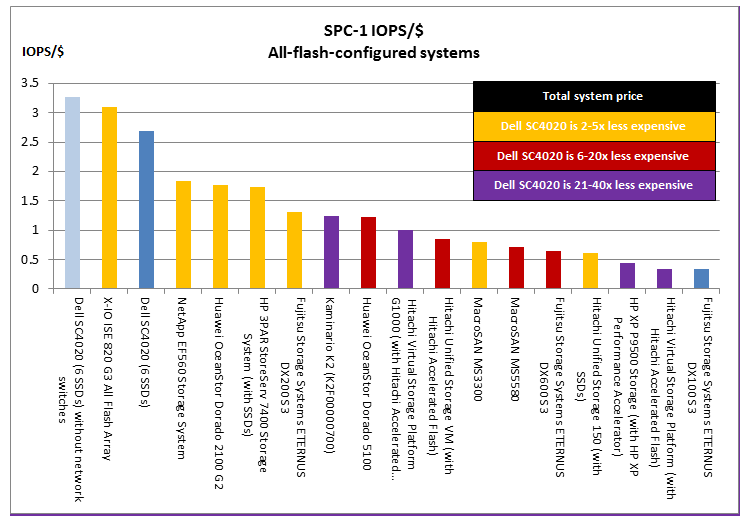Ed Note: This blog has been authored by Sonya Sexton from Dell Storage
A driving priority of customers everywhere is to consolidate more of their work on less hardware, for example, more virtual machines per server, as well as bigger workloads per virtual machine. Multi-core server processors, an important enabler of workload consolidation, have been an affordable evolutionary advancement that customers have been able to pervasively embrace. On the other hand, high-performance storage, which is equally essential to workload consolidation, has remained too expensive for widespread adoption. In fact, disk performance remains one of the principle productivity inhibitors in many customer environments today.
SPC-1 shines a light on storage performance
The SPC-1 benchmark is a good place to turn for insight on how well storage systems from various vendors can support workload consolidation and budget objectives. SPC-1 is an audited, standardized benchmark that measures block I/O performance and reports results and associated costs for all participating vendors. It is designed to significantly stress disk array systems with a mix of workload characteristics, including large and small blocks, as well as random and sequential I/O that includes writes, over-writes, read-after-writes and hotspots. It mimics a broad class of block-based business-critical applications. Storage systems that perform well on SPC-1 will usually handle the performance rigors inherent with heavily consolidated business-critical applications extremely well.
Dell SC4020: High SPC-1 results for least investment
In a recent SPC-1 benchmark, Dell achieved 112,479.81 IOPS on an all-flash-configured Dell SC4020 storage system priced below $50K. What’s more, the SC4020 executed 100% of the benchmark workload with an average response time that is 2x faster than optimal metrics for business-critical applications such as Oracle and ~3x faster with 90% of the benchmark workload.[1] This is an unprecedented achievement in affordable high performance. It represents an evolution in storage economics that can enable customers everywhere to take game-changing steps forward in productivity. This is big news.
| SPC-1 reported data for Dell SC4020, configured with 6 SSDs | |
| SPC-1 IOPS™ | 112,479.81 |
| SPC-1 price-performance™ | $0.37/SPC-1 IOPS™ |
| Average response time (ms) all ASUs, 100% workload | 4.83 ms |
| Average response time (ms) all ASUs, 90% workload | 3.10 ms |
| Total system price | $41,836.40 USD |
What are you paying for the performance delivered?
The SC4020 is the most affordable system listed in the active SPC-1 results published. Furthermore, the SC4020 holds an exemplary position in price/performance value, as indicated in the chart below. Notably, the SC4020 is the only system configured as an all-inclusive SAN with network switches. If you level the field by subtracting the cost of the switches from the SC4020 total system price, Dell’s IOPS-per-price rating trumps all the contenders.
Why these results matter?
The SPC-1 results affirm the extraordinary affordability and price/performance value of the SC4020. This is consequential to all businesses, large and small, because affordable high-performance storage can contribute to business success in a multitude of ways. It can help companies reach new customers and embrace new opportunities or embark more aggressively on innovation with lower up-front investment. Storage that excels in price/performance value can help cut costs from business operations, even as data requirements continue to ramp steadily. Low acquisition costs, especially for a feature-rich system such as the SC4020, can enable small, growing companies to set higher goals and meet new growth objectives, even on a small budget.
Connect with us on Twitter @Dell Storage.
[1] For multi-block reads(common in full table scans and Index fast full scans), Tier-1 storage should provide an average IO wait time in the range of 10-15ms: Thiru Vadivelu, Tune your Oracle Automatic Storage Management, http://www.orafaq.com/papers/tuning_asm.pdf, pg. 3.

